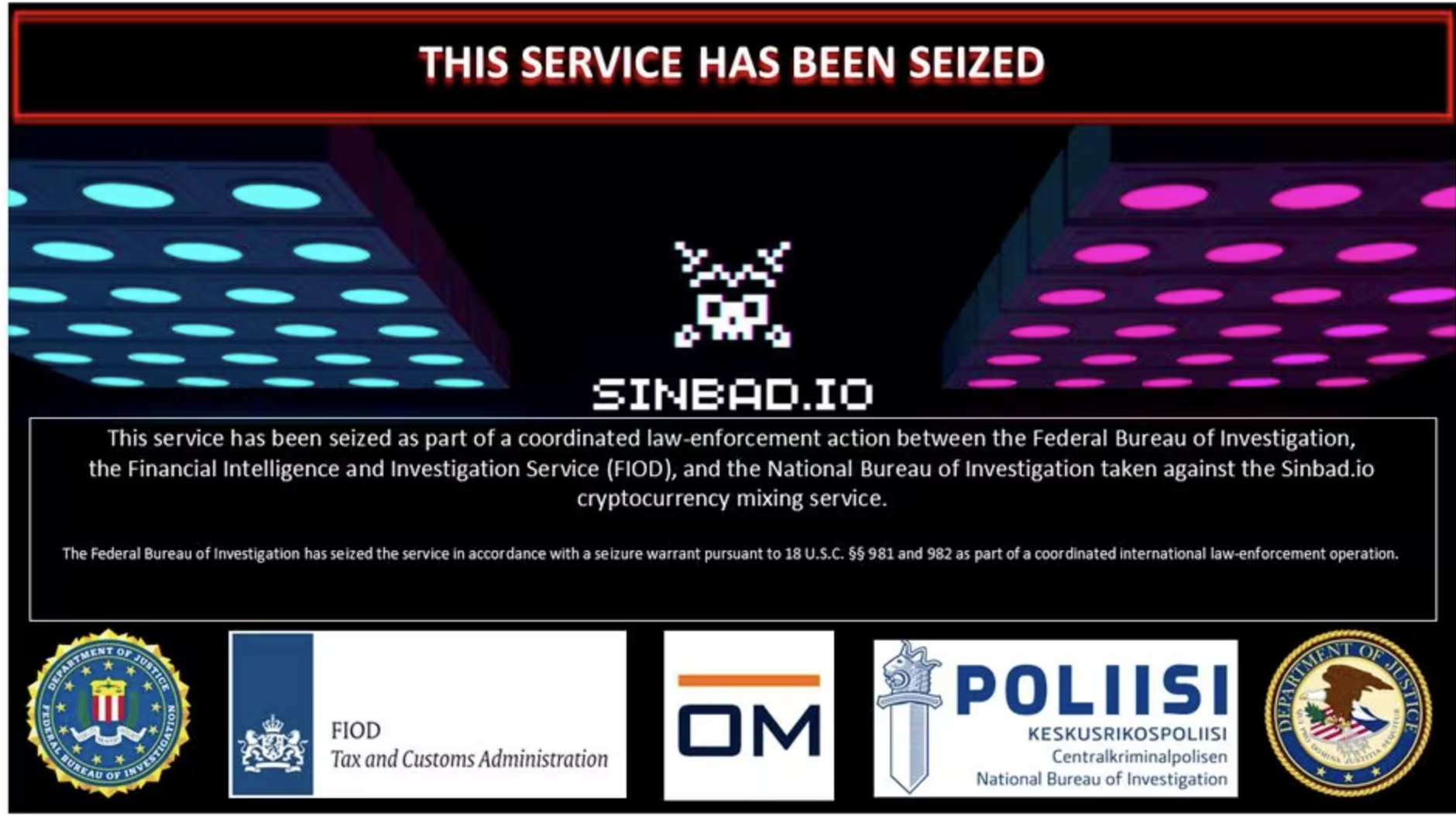U.S. Treasury Targets Sinbad for Alleged North Korea Links
U.S. Treasury Cracks Down on Crypto Mixer Sinbad Amidst North Korea Allegations; FBI and Global Agencies Seize Website.
In a significant move, the U.S. Treasury Department has taken decisive action against the crypto mixing service Sinbad, alleging its involvement in transactions linked to North Korea’s notorious hacking group, the Lazarus Group.
The Treasury’s measures include blocking Sinbad from the global dollar financial system and the seizure of its website by a joint operation involving the FBI, Dutch Financial Intelligence and Investigation Service (FIOD), Openbaar Ministerie (the Netherlands’ public prosecutor’s office), and the Finnish National Bureau of Investigation.
This crackdown comes as a response to Sinbad’s role as a key money-laundering tool for the state-sponsored cyber hacking activities of the Democratic People’s Republic of Korea (DPRK), according to a Treasury press release.
The Treasury’s Office of Foreign Assets Control (OFAC) has specifically designated two Bitcoin addresses and two email addresses associated with Sinbad, prohibiting all U.S. individuals and anyone engaged with the global financial system from interacting with these addresses in the future.
A recent examination of one address reveals a current balance of approximately 0.35 BTC (equivalent to $13,000), with a total inflow of over 15 BTC (valued at around $570,000 at current market prices). Another designated address, identified as an alternate, holds approximately $67 worth of bitcoin.
Sinbad, as per the Treasury’s findings, has been implicated in processing funds obtained from the hacking incidents of Horizon Bridge and Axie Infinity.
Moreover, it has facilitated the movement of funds associated with various illicit activities, including sanctions evasion, drug trafficking, the purchase of child sexual abuse materials, and additional illegal sales on darknet marketplaces.
Chainalysis, a crypto analytics service, noted that Sinbad is a relatively new entrant into the mixer space, having initiated its operations and advertising in October 2022.
The service’s rapid rise to prominence underscores its significance as a facilitator for cybercriminal activities. Notably, Sinbad was reportedly employed in the movement of funds pilfered from Atomic Wallet earlier this year, involving a staggering $35 million.
This revelation was brought to light by fellow analytics service Elliptic. Despite Sinbad’s relatively short existence, its impact on the crypto landscape has been substantial, with its services allegedly utilized for a range of nefarious activities beyond conventional money laundering.
As the U.S. Department of Justice remains tight-lipped, a spokesperson referred inquiries to the FBI, the agency spearheading the investigation. However, the FBI has yet to provide immediate comments or responses to queries.
The collaborative efforts of global law enforcement agencies in seizing Sinbad’s website and blocking its associated addresses signal a unified stance against crypto-enabled criminal activities.
This coordinated action reflects a growing commitment to curb the illicit use of cryptocurrencies, safeguarding the integrity of the global financial system and protecting individuals from the adverse impacts of cybercrime.
The implications of Sinbad’s alleged involvement in high-profile hacking incidents and illicit fund movements highlight the challenges authorities face in policing the rapidly evolving crypto landscape.
The mixer’s connection to the Lazarus Group, a state-sponsored hacking entity, raises concerns about the intersection of cybercrime and geopolitical tensions.
As governments worldwide grapple with the dual challenge of adapting regulations to the digital age and combating cyber threats, this case underscores the necessity for international collaboration in addressing the multifaceted issues arising from crypto-related criminal activities.
he specific details of Sinbad’s role in processing funds from notorious hacking incidents, such as those involving Horizon Bridge and Axie Infinity, shed light on the operational scale and scope of the mixer’s illicit activities.
The Treasury’s designation of Bitcoin addresses and email addresses associated with Sinbad reflects a strategic effort to cut off its ties to the global financial system, thereby disrupting its ability to facilitate further criminal transactions.
This action serves as a clear message that regulators and law enforcement agencies are actively monitoring and intervening in the crypto space to ensure compliance with anti-money laundering (AML) and counter-terrorism financing (CTF) regulations.
The financial impact of Sinbad’s operations is evident in the cryptocurrency holdings associated with its identified Bitcoin addresses. The movement of significant sums, including funds stolen from Atomic Wallet, highlights the mixer’s role in enabling large-scale financial crimes.
With Elliptic’s claim that Sinbad was involved in the movement of $35 million stolen earlier this year, the case raises questions about the effectiveness of existing security measures within the crypto ecosystem.
As authorities respond to these challenges, it becomes imperative to explore innovative solutions and enhance collaboration between the public and private sectors to stay ahead of evolving cyber threats.
As the investigation unfolds, the global community will be closely watching for further developments in this landmark case. The joint efforts of international law enforcement agencies, including the FBI, Dutch authorities, and the Finnish National Bureau of Investigation, demonstrate a commitment to holding accountable those who exploit cryptocurrencies for illegal purposes.
This incident serves as a pivotal moment in the ongoing narrative surrounding the regulation and oversight of the crypto space, prompting a reevaluation of existing frameworks and the need for proactive measures to mitigate the risks associated with the intersection of technology, finance, and criminal activity.








